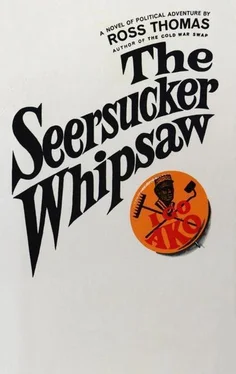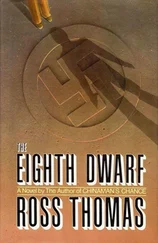“He’s gone,” I said. “He’s worried about us — thinks we may be coming down with either malaria, cultural shock, or both.”
“He was always a worrier.”
“You knew him in the war?”
“I knew him.”
“You don’t like him?”
Shartelle yawned. “It’s not that I don’t like him, Pete, it’s just that I don’t have any use for him. He means well, but I’d rather have somebody call me a son of a bitch than to say I mean well. Let’s forget him. When are we supposed to see Kramer, the old China hand?”
“We’re to call him. You want me to?”
“I’ll do it,” Shartelle said. He picked up the phone and asked for the American Consulate. “That’s right,” he said. “The American Consulate.” He listened for a while and then held the phone away from his head and stared at it. Then he put it back to his ear and said: “Try the United States Consulate then... I know I asked for the American Consulate... Now I’d like to talk to somebody at the United States Consulate... No, I don’t want to talk to somebody in the United States, I want to talk to the United States Consulate.” He was pacing now, as far as the short cord would allow. He covered the mouth of the phone with his hand and turned to me: “He wants me to talk to his supervisor.”
“I’ve heard that it usually takes fifteen minutes,” I said. “I’ll let you make all the calls.”
There were three or four more minutes of palaver with the operator’s supervisor before the call went through. Shartelle identified himself, asked for Kramer, was told he was out dedicating a USIS library in Eastern Albertia, and was switched to somebody else. Shartelle’s eyebrows shot up at a question he was asked over the phone. “Why, yes, we’d be happy to see him... Yes, that would be convenient. In half an hour. Fine.” He hung up and walked back over to the window to look at the harbor some more.
“Kramer’s gone for the day.”
“I heard.”
“But we’ve got another appointment.”
“In half an hour,” I said as I changed into my coal and air suit.
“With the political affairs officer.”
“Who’s he?”
“Clarence Coit.”
“Who’s Clarence Coit?”
“He was very big in South America at one time. Made quite a reputation for himself.”
“Doing what?”
“Setting up coups for the CIA.”
We went downstairs to the cocktail lounge and found an Australian bartender who claimed that he could mix a fair martini. He could. We finished two of them and wandered out through the lobby that looked like the lobby in almost any new hotel you find between Miami and Beirut. Lots of marble and murals and rugs and sand-filled butt receptacles. The Lebanese clerks still held down the front desk and the robed Albertians still toted the bags.
William had parked the Humber in the circular drive under the shade of a tree. He saw us, started the car, and pulled up in front of the door. Shartelle started to get in the front seat.
“Mastah ride in back,” William said firmly.
“Why?”
“Proper, Sah. Proper Mastah ride in back.”
Shartelle got in the back with me. “You know where the United States Consulate is?” he asked.
“American Consulate, yes, Sah. Na far.”
“Let’s go there.”
It wasn’t far, only a half a mile or so. It looked as if it had been built just after World War II by some architect who was overly influenced by the southern California mission school of design. It rambled over an acre or so of shrubbery, flowers and lawn, protected from the Albertians by a high, wrought-iron fence, and shielded from the elements by a red tiled roof that looked as if it were made out of old London chimney pots split in half. We drove through the open gates to the front entrance. There were no guards; the Marines would come after independence when the Consulate achieved embassy status.
The receptionist was a brunette with too much lipstick, too little to do, and a St. Paul accent. She summoned an Albertian and told him to escort us to Mr. Coit’s office. Then she went back to her nails. We followed the Albertian down a hall that sported some reproductions of Frederic Remington’s Indians and cowboys and turned left. “In here, gentlemen,” the Albertian said, indicating a door. We went through the door into a medium-sized reception office that was staffed by a small blonde with popped green eyes and a none-too-ready smile.
“Mr. Shartelle and Mr. Upshaw?” she asked.
We said yes and she talked over the phone briefly. “Mr. Coit will be with you in a moment,” she said. “Do sit down.”
We sat down and Shartelle lighted one of his Sweet Ariels. The secretary kept on typing. The air-conditioner droned away in its effort to keep the room at seventy-two degrees. There was nothing to talk about. We waited with the resigned air of a salesman and his trainee in the outer office of the purchasing agent who hasn’t placed an order in seven months and isn’t likely to do so today.
After ten minutes the door opened and a man came out. He gave us a quick look, the kind that is given to cripples by people who like to examine the affliction but don’t want to get caught at it. He hurried through the door into the hall.
The telephone on the secretary’s desk rang. She picked it up and said yes. She hung up and looked at us. “Mr. Coit will see you now,” she said. “Just through that door.”
We went through that door and into a large office that contained a desk, some filing cabinets with combination locks on them, some chairs, a coffee table, a divan, a man, and a calendar on the wall. The calendar was of the screwed- up British variety with the days of the weeks in the wrong place. Each day that had passed that month was carefully marked out. The even days were marked out in red, the odd days in green. The furniture was all battleship gray and streamlined to cut down the wind resistance.
The man was behind the desk and he came at us like a rush captain at Phi Delta Theta. There was the firm quick handshake, the bustling around to make sure that the chairs were comfortable, the shifting of the ashtrays to more convenient positions. Clarence Coit wanted us to like him; maybe he wanted everybody to like him, and the best way to achieve that, he may have decided, was to like everybody.
We got settled in the chairs and looked at each other pleasantly. Coit was as tall as Shartelle, around six-foot-two, and he had smooth black hair that he combed straight back over a wide forehead. His features were regular, his teeth were white, and he displayed them in a slightly crooked, deprecatory smile every chance he got. His nose was only a nose, but his chin was nice and firm and jutted just a bit. He had dark blue eyes that were set under thick eyebrows that had no curve. The pupils flicked here and there. They were restless eyes that gave Shartelle’s suit a frankly appreciative appraisal.
“I’m sorry that Kramer is out, but I’m damned glad you could drop by this afternoon and I hope I haven’t interfered with your schedule.” He had a smooth baritone.
I let the spokesman of our team do the talking. If Coit was with the CIA, he could match wits with the professional country boy and may the best liar win. I decided to root for Shartelle.
Giving his elegant vest a tug, Shartelle replied that Mr. Coit surely hadn’t interfered with our schedule, that it was still in the making, and because of the nature of our business in Albertia, it was right kind of him to spare us a few moments. As Political Affairs Officer, he might give us some tips that could save us needless drudgery and fruitless quests. It was, the way Shartelle laid it on, as nice a glob of sandy mortar as I’d yet seen him pat into place.
Coit sat through it all, his hands folded on the empty desk in front of him, his eyes fixed on Shartelle, his fine head nodding every now and then to signal the speaker that he was coming through nicely. Coit was a professional listener. If he had turned the act on for me, I would have talked all day, beginning with the time when I was three and they had stolen my tricycle. It was blue with a bell on the handle bars and studded metal plates on the rear axle that a small passenger could stand on.
Читать дальше












